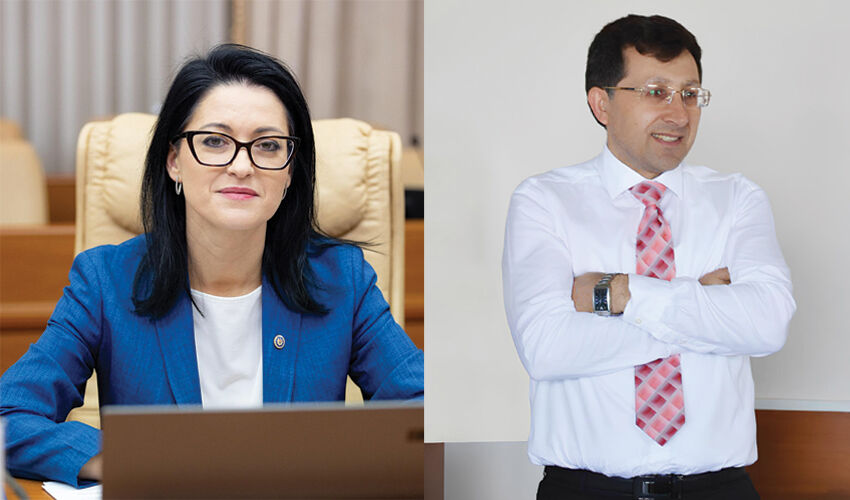
Natalia Plougarou, Alik Byrcae
“A healthy economy must be reflected in people’s well-being through higher wages and pensions, safe jobs and accessible social services. Through active employment policies, support for families with children, and expanded programs for seniors and people with disabilities, we take responsibility to take care of everyone,” the document says.
According to the new Minister of Labor and Social Protection Natalia Plugaru, there are already decent results thanks to the restructuring and reforms carried out both in the Employment Agency and in the Labor Inspectorate.
According to the economic analysis “Trends in Moldova’s economy”, published every six months by the National Institute of Economic Research, the labor force in the first half of 2025 amounted to 804.25 thousand people, decreasing by 10.5%. The economic activity rate amounted to 40.7%, decreasing by 9.4% compared to the same period last year. The number of employed population in the first half of the year amounted to 768.90 thousand people, decreasing by 9.21% compared to last year. Accordingly, the employment rate reached 38.9%, recording a decrease of 4.2 p.p. The number of unemployed decreased by 5.1% to 35.4 thousand people, but the unemployment rate increased by 0.3 p.p., reaching 4.4%. The decrease in the number of unemployed with a simultaneous increase in the unemployment rate is explained by the reduction in the total labor force. According to the Institute’s forecasts, by the end of the year the unemployment rate will not exceed 4%.
Alik Byrca, professor at the Academy of Economic Knowledge of Moldova, in an interview with Logos Press expressed the opinion that the achievement of the goal of 100 thousand new jobs will be possible only if investments are actively attracted to the country: “This will be possible if investments are attracted to Moldova and informal employment is transformed into formal employment. And this, in turn, reflects the growth of jobs in the country. If there will be a favorable investment climate, especially when starting the process of opening clusters for accession, investors will look at Moldova differently. But it is also important to consider the war in Ukraine. This is a risk, because investors do not come where there is no security, stability and conditions for comfortable political, economic and social investments”.
In July, the Parliament adopted the Law on free movement and residence on the territory of the Republic of Moldova of citizens of the European Union and their family members. The purpose of the draft law is “to create a national legal framework compliant with EU requirements, which will regulate and facilitate the exercise of the right of EU citizens and their family members to free movement and residence on the territory of Moldova, including free access to the labor market.
The law introduces the concept of “EU worker” – an EU citizen who is employed or engaged in self-employment on the territory of the Republic of Moldova in accordance with the legislation.
There is an opinion that this way the state will really manage to reach the figure of 100 thousand newly employed, but it will lead to an imbalance of the internal labor market. However, Labor Minister Natalia Plugaru assured that now the ministry is taking active measures to employ, first of all, citizens of the country: “We want to make sure that unemployed citizens of the Republic of Moldova, who are looking for a job, will be able to get a job”.
According to Alic Byrca, Moldova is not threatened by an imbalance in the labor market: EU citizens are unlikely to be interested in our salaries.
“For EU citizens to come to work in Moldova, it is necessary to offer them salaries higher than in their countries. Therefore, I do not think that Moldova’s labor market will be attractive for them at this stage. Most likely, the labor force will come from the East, which has already been observed for some time. At the same time, taking into account the shortage of labor force in Moldova, employers are interested in this – it is profitable to hire foreign workers, as they agree to a lower salary compared to the requirements of our citizens. This gives more confidence: a foreign employee will work for at least a year under a contract. Our citizens can leave after a week or a month if they don’t like something, which creates problems for employers. If we speak only about EU citizens, I don’t see any problems, as a mass flow of people willing to work in Moldova at the current level of salaries is not expected”.
In Moldova, the minimum wage is 5500 lei per month, which is about 280 euros at the current exchange rate. In Romania, the minimum gross wage is 4050 Romanian lei per month, which is about 800 euros. And even if we raise it to 8050 lei, as labor unions have recently demanded, it will still be less than half the current minimum wage in Romania. In Germany, the legal minimum wage is 12.82 euros gross per hour. Ours is almost eight times less. In the EU as a whole, the minimum wage ranges from 550 euros in Bulgaria to over 2,638 for unskilled workers in Luxembourg.
In a report presented in Brussels on November 4, the European Commission confirmed that Moldova has reached a certain level of readiness in the field of free movement of workers. During the reporting period, Moldova signed additional bilateral agreements on the coordination of social security systems with the EU member states, as well as continued the preparatory work for joining the European Network of Employment Services (EURES) after the EU accession. In addition, Moldova concluded a cooperation agreement with the European Labor Authority. At the same time, last year’s EU recommendations were partially implemented and remain relevant. In the coming year, Moldova should, in particular, harmonize national legislation with the EU acquis on access of EU citizens to the labor market, conclude additional agreements on the coordination of social security systems and develop the IT infrastructure for the European Health Insurance Card and the Electronic Exchange of Social Security Information.
The head of the Legal Department of the National Confederation of Trade Unions of Moldova, Eugen Covrig, said Moldova is obliged to comply with EU directives, including ensuring the right of EU citizens to work in the country, regardless of the consequences. “Since we have obligations to transpose certain directives, including the obligation to guarantee EU citizens the right to come to Moldova and work here, we cannot deviate from these obligations. If we have accepted them, there is no room for hesitation. Regardless of the consequences – in some cases it will be detrimental, in other cases it will be beneficial. I am speaking exclusively from the legal point of view, not from political or pragmatic aspects,” Eugen Covrig said in an interview with Logos Press.
Experts believe that in theory it is possible to reach 100 thousand new employees in four years, but there are a lot of factors that the government will have to take into account. At the same time, if something goes wrong, no one has given any guarantees. As a competent interlocutor of the newspaper pointed out, there is a big difference between the phrases “to employ 100 thousand people” and “to support the employment of 100 thousand people”.

